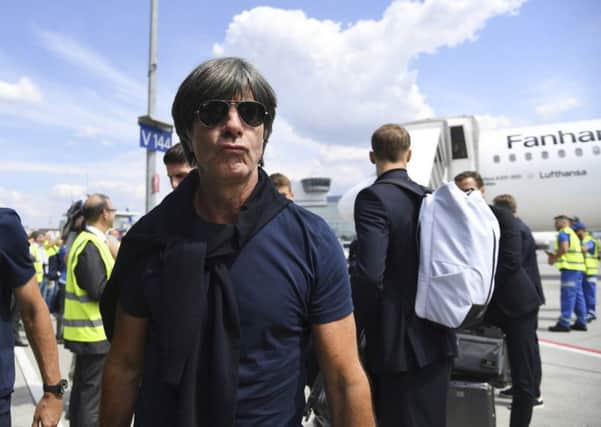Deposed Germany must wise up to new reality


Fox Sports Brazil fired off a tweet of a zillion characters made up entirely of two recurring letters. It read: “AHAHA…” You have to be heavily invested in outcomes to feel that profoundly about a thing. Clearly enjoying the crushing defeat by South Korea came easily to a Brazilian broadcast outlet after the 7-1 semi-final thrashing administered by Germany to the Selecao four years ago en route to a fourth World Cup victory.
That Germany’s humbling was front page news in England never mind back also reveals how much of a hold German football has over the English psyche. As many have pointed out, this is the first time since 1966 that England have progressed further than Germany at a major competition in which they have both appeared.
Advertisement
Hide AdAdvertisement
Hide AdAnd after England’s enterprising start under Gareth Southgate, Germany’s most popular daily newspaper, Bild, even ran a headline lamenting their lack of a Harry Kane. “Kane hatten wir auch gerne”, which translates as “we wish we had Kane”.
Indeed so. Like his curiously bobbed haircut coach Joachim Low’s team has looked a tad out of step with current mores, not only misfiring but misreading the landscape and the quality of their opponents. Any team can walk into an ambush but there was something about the hauteur of the German players that left them unable to respond to the urgency of those Mexican hustlers in the first group game. Low and his players were caught out by Mexico’s dynamism, their persistence, their pressing, the big shifts put in across the park. A sense of entitlement seemed to inform Germany’s approach, as if a goal were inevitable because of who they were. If this World Cup has taught us anything it is the narrowing of the gap between the great powers and the lesser gods. Better prep, coaching, training methods, conditioning has armed modest teams not only with the weapons to compete but to surprise.
Germany required an added -time winner against Sweden to gain a purchase in the group but that served only to mask the problems. Low maintains that this outcome does not reflect fundamental structural flaws in German football and must meet with a measured response. “We just have to draw the right conclusions,” he said. Here are some to consider. Low must start at the top with an honest appraisal of himself. First up he saw Marco Reus and Julian Draxler as better options than Leroy Sane. Watching a team bereft of a cutting edge, that looked a bad decision against Mexico and a shocker against South Korea.
The squad is not old. Only three of the 23 are over 29. But they do have miles on the clock, the core of the group having been brought through eight years ago from the under-21s. The issue then is one of renewal. Thomas Muller, always an eccentric presence, looked shot. Sami Khedira was flat and ineffective. Mezut Ozil, who might have been in an Arsenal shirt, likewise. Reus is not the player he was and Draxler has not delivered on his wunderkid promise.
Of the younger breed, Timo Werner lacked support in attack and Julian Brandt did not have the faith of his coach. This left Toni Kroos with too much to do on his own.
There was some irony in the “sophisticated” Germans’ desperate appeal to the big man from the bench to save them with a lumpy header. Unfortunately Mario Gomez is no longer super.
Germany were not helped either by the pre-tournament PR gaffe that engulfed Ozil and Ilkay Gundogen, their Turkish heritage hopelessly manipulated by the comms machine of President Recep Erdogan in London. This fed uncomfortably in the speculative space surrounding talk of a fault line between the “Bling Bling gang” purportedly made up of Ozil, Khedira, Draxler and Jerome Boateng, and the Bavarian set, comprising Manuel Neuer, Kroos, Muller and Mats Hummels.
This stuff gets laughed off when you are winning. When you lose, people start looking for answers, the more conspiratorial the better. Had Germany squeezed through they might easily have found a rhythm, after all worse teams have started poorly and prevailed. Portugal claimed the 2016 Euros without winning a match in normal time. In 1982 Italy were lampooned for their poor form, failing to beat either Peru or Cameroon in their group, and ended up beating, irony of ironies, West Germany in the final.
Advertisement
Hide AdAdvertisement
Hide AdAlbeit a hugely painful kick in the goolies for the Germans to absorb, I suspect this hiccup is little more than a correction imposed by providence, a warning to Germany to wise up to a new reality in which reputations no longer offer a goal start. Like all Teutonic terminators, you know they’ll be back, shoving all that schadenfreude down everyone’s throats.